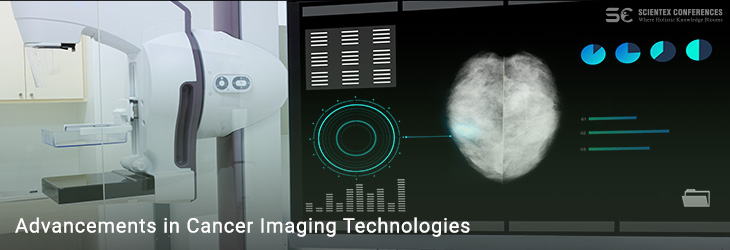Track: Advancements in Cancer Imaging Technologies

The session on "Advancements in Cancer Imaging Technologies" will focus on the cutting-edge imaging techniques that are revolutionizing cancer detection, diagnosis, and treatment. Imaging plays a crucial role in oncology, providing detailed visualizations of tumors, guiding biopsies, and helping clinicians monitor treatment responses. This session will explore both well-established and emerging imaging modalities, highlighting their benefits, applications, and contributions to personalized cancer care.
Advancements in Cancer Imaging Technologies session will offer an overview of the latest advancements in cancer imaging technologies, highlighting their impact on improving cancer diagnosis, treatment planning, and patient outcomes.
Recent advancements in Computed Tomography(CT) imaging include high-resolution images, scans and dual-energy CT, which improve image clarity and provide more accurate assessments of tumor size, location, and involvement with surrounding tissues.
Magnetic Resonance Imaging(MRI) is essential for visualizing soft tissues, making it particularly valuable in detecting brain, spinal cord, and musculoskeletal tumors. These advancements are aiding in more accurate diagnoses and personalized treatment planning.
X-rays and traditional radiography continue to play a foundational role in oncology. Advances in digital radiography and low-dose X-rays are minimizing radiation exposure while delivering higher-quality images, improving safety and accuracy in patient care.
Digital Mammography technique provides enhanced image contrast, enabling earlier detection of small tumors that may not be visible with traditional mammography.
Ultrasound is widely used for imaging soft tissues and guiding needle biopsies for cancer diagnosis. These innovations are enhancing the accuracy of cancer diagnoses and reducing the need for more invasive diagnostic procedures.
Molecular and Nuclear Imaging Techniques, such as PET and SPECT scans, are transforming cancer care by allowing for the visualization of cellular processes. These imaging modalities are instrumental in staging cancer, evaluating treatment response, and detecting recurrent disease.
Scientific Highlights
- Cancer Research Therapy and Autoimmune Diseases
- Cancer Biology and Biomarkers
- Types and Causes of Cancer
- Hematology in Cancer
- Organ Specific Cancer
- Cancer: Awareness, Lifestyle and Nutrition
- Oncology Subspecialties
- Advancements in Cancer Imaging Technologies
- Cancer Genomics and Epidemiology
- Cancer and Immunology
- Tumor Pathology and Cancer Cytopathology
- Cancer Pathophysiology
- Neuro and Radiation Oncology
- Stem Cell, Gene Therapy and CAR-T Cell Therapy
- Prevention and Palliative Care in Cancer
- Rehabilitation of Cancer Survivors
- Cancer Screening and Diagnosis
- Clinical Trials of Cancer
- Cancer Treatment and Traditional Therapies
- Complementary and Alternative Cancer therapy
- Artificial Intelligence in Cancer Research
- Future Technology in Oncology
- COVID-19 and Its Impact on Cancer


